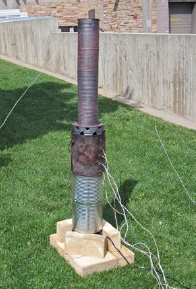Water Treatment with Biochar

Josh Kearns
Aqueous Solutions
http://www.aqsolutions.org
Contamination of drinking water sources by synthetic organic compounds (SOCs – e.g. pesticides, pharmaceuticals, fuel compounds) is a growing worldwide problem. Many of these chemicals bio-accumulate in the human body and cause cancer, birth defects and diseases of the reproductive system, and disrupt endocrine and neurological systems. However, few low-cost, sustainable and appropriate treatment technologies are available to rural and developing communities for SOC removal. Moreover, SOCs are rarely or not-at-all addressed in the majority of safe drinking water programs implemented by major international development NGOs and government agencies, university research programs, philanthropic organizations, non-profits, faith-based charities, etc.
In advanced centralized water treatment systems, adsorption by activated carbon (AC) is considered the best available technology for the removal of SOCs. However, the manufacture of AC is a sophisticated (and often proprietary) industrial process and cannot be replicated at the location and scale of rural and developing communities. Under these circumstances, charcoals produced by traditional kiln systems may serve as an effective, low-cost local surrogate for commercial AC as they exhibit similar molecular-scale properties (e.g. porosity and internal surface area, surface reactive sites). In fact, water filtration using charcoal is an ancient practice that continues today in non-industrialized regions around the world, though it has not yet been rigorously demonstrated for removal of modern industrial pollutants.
Unfortunately, charcoal production by traditional kiln systems is often a resource-intensive and highly polluting process. Moreover, traditional charcoals are manufactured primarily as fuel for cooking or smelting of ores; kiln processes are typically not optimized for production of water filter char. Low cost, energy efficient, environmentally sustainable and scalable local production of optimal water filter char can be accomplished with biomass gasification. Char-producing gasifier stoves are rapidly being disseminated for household cooking and heating as they provide energy efficient combustion with reduced emissions. Intermediate- and large-scale gasifier systems are being deployed around the world for generation of “biochar” as an agricultural soil amendment to increase crop yields and sequester carbon.
The purposes of this document are to (1) summarize preliminary results of collaborative field and laboratory research pertaining to the use of traditional kiln charcoals and gasifier chars in decentralized water treatment that targets SOCs, (2) provide a detailed how-to guide for construction and operation of an intermediate scale (200 L) gasifier char production unit using local materials, and (3) provide a detailed how-to guide for integration of biochar filtration into a multi-barrier intermediate-scale (2000 L/day) water treatment system constructed from inexpensive and widely available materials.
The information and design specifications presented here are open source / open architecture. We invite critical feedback from field engineers and WASH (water-sanitation-hygiene) sector development practitioners, university researchers, sustainable development NGOs, etc.
